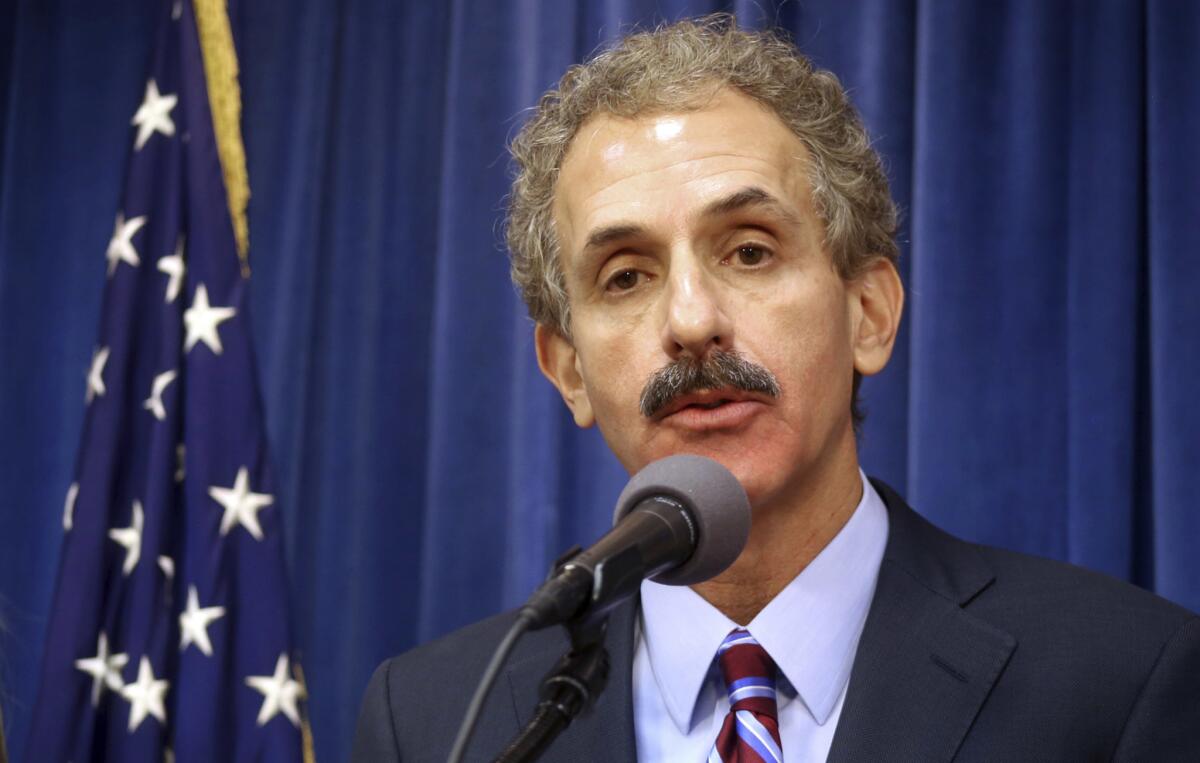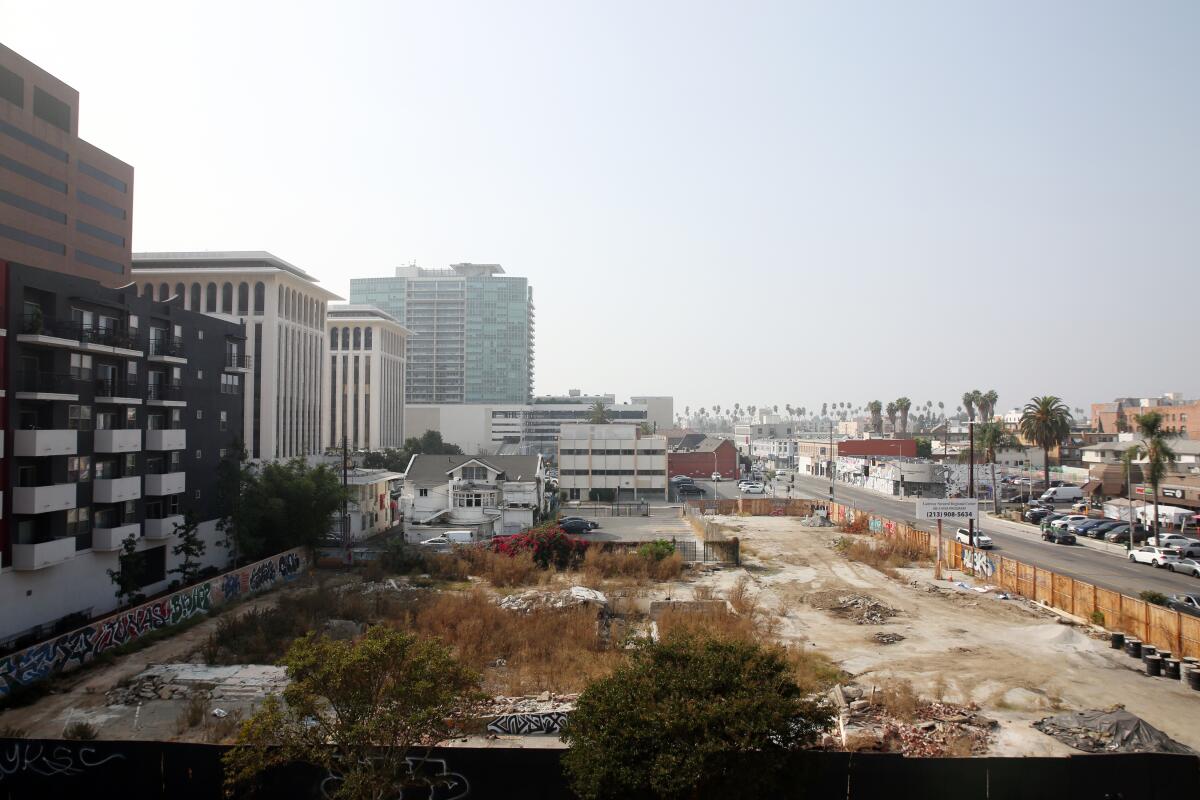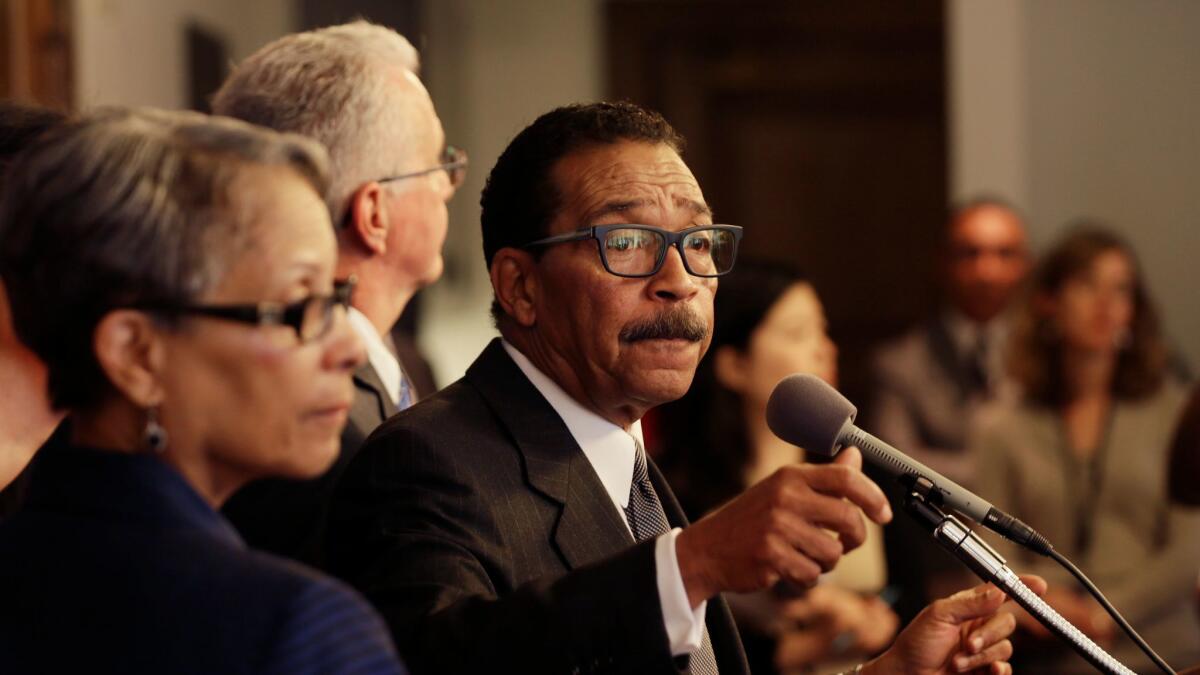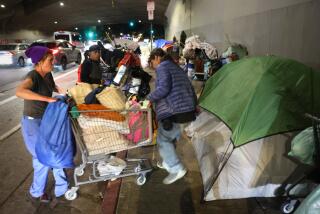L.A. council members backtrack, turning against request to help a hotel developer

Nine years ago, a judge found that a financially struggling hotel in Koreatown had failed to pay its share of local taxes, ruling that the company owed the city of Los Angeles nearly $3.5 million.
City officials, reeling from their own financial crisis, were so eager to collect that they sent sheriff’s deputies into the Wilshire Boulevard hotel to retrieve a portion of the money. The City Council eventually reached a legal settlement in 2012, securing $2.65 million — less than officials claimed they were owed — from the hotel and its owner, Leo Y. Lee.
Council members began dealing with Lee again earlier this year. But this time, they began looking at providing financial help for his latest venture: a new 192-room hotel planned in another part of Koreatown.
After The Times inquired about the city’s 2010 lawsuit against Lee, City Atty. Mike Feuer said he would oppose any financial aid for Lee’s planned hotel. Such an arrangement, while not illegal, would be “outrageous,” he said.
“I think it takes real chutzpah for a developer to try to avoid paying millions in taxes that he owed to the city, and then return and ask taxpayers for a subsidy,” Feuer told The Times last week.
Councilman Herb Wesson, after speaking with Feuer, is now backtracking on the idea of a hotel subsidy — and asking his colleagues to vote Tuesday to drop the effort. Councilman Curren Price, who previously supported Wesson’s request to explore financial aid for Lee’s hotel, now opposes any taxpayer assistance, according to his spokeswoman.
Victor Sahn, who served as the hotel developer’s bankruptcy lawyer in 2012, says his client is being wrongly portrayed as a “deadbeat.”
Lee was one of many businesses owners overwhelmed during the 2008 recession, losing millions of dollars, Sahn said. The businessman also had a “bona fide” dispute with the city, arguing that some parts of his building were being rented by the month and therefore did not require payment of transient occupancy taxes, also known as bed taxes, the lawyer said.
Lee’s hotel companies filed for bankruptcy in 2011. Once Lee succeeded in selling the property, he used the proceeds to pay off his obligations, the lawyer said.
“People are playing a blame game with someone who shouldn’t be blamed, who did his best to keep a project going,” Sahn said. “And when he couldn’t keep it going, he sold it and paid his creditors as much as he possibly could.”
Wesson and Price first broached the idea of providing financial help to Lee’s planned 21-story hotel last year. Both men signed a motion asking the city’s policy analysts to determine whether Lee’s company, 3800 West Sixth Street LLC, should be allowed to keep a portion of the taxes generated by his hotel project.

Wesson had argued that Lee’s hotel could supply more rooms for the city’s Convention Center, located three miles away. The council voted unanimously in February to analyze that idea, bringing in a consulting firm to review Lee’s request. Under the plan, Lee would reimburse the city for the consulting work.
Since June 2016, Lee, his wife, his company and his business associates have donated at least $67,400 to various council candidates and council members, supporting their campaigns, their legal and office holder accounts and a political action committee that supported council members’ reelection, according to contribution records.
Lee gave $25,000 to the Progressive Growth PAC, an independent expenditure committee that worked in 2017 to reelect Price, who heads the council panel that reviews requests from hotel developers for financial help. That PAC also collected $75,000 from a different developer who succeeded in getting Price to approve three massive digital billboards on his property.
Lobbyist Michael Bai, a former Wesson staffer, has been representing Lee’s hotel project at City Hall and was a principal officer for the Progressive Growth PAC.
Lee, his wife, his company and his business associates also have donated at least $15,000 to Wesson’s current bid for county supervisor and at least $5,400 to his office holder and legal committees, contribution records show.
Wesson, who represents Koreatown, has been a supporter of Lee’s proposed 21-story hotel, sending an aide to speak in favor of it at a planning hearing last year. Last week, after being contacted by Feuer about Lee’s tax history, the councilman drafted a new motion calling on his colleagues to rescind the plan for exploring financial aid for the hotel, Wesson spokesman Michael Tonetti said.

Tonetti said Wesson did not know about Lee’s previous legal dispute with the city until he heard from Feuer’s office. Price spokeswoman Angelina Valencia said her boss learned about Lee’s tax history from Wesson’s office.
The council has signed off on hundreds of millions of dollars in financial support for downtown hotels since 2005, portraying that aid as critical to providing rooms near the convention center. In some cases, council members have allowed developers to keep as much as half of the local tax revenue their project generates, including sales, property and utility taxes.
Those types of deals have become more controversial in recent months.
Homeless activists have called, without success, for city leaders to seize private hotels and convert them into makeshift shelters for L.A.’s unhoused residents. Hotels that received taxpayer assistance should have been the first to help, those activists said.
“Our stance is homes not hotels,” said Jed Parriott, an organizer with the Services not Sweeps Coalition. “If they’re going to be developing anything, they should be prioritizing low income or permanent supportive housing for homeless folks.”
Sahn, the lawyer for Lee, said his client has recovered from his financial difficulties, becoming a highly successful businessman. Given what has happened to the hospitality industry in the wake of the COVID-19 pandemic, Lee’s hotel project merits city financial help, he said.
Without that support, Sahn warned, Lee’s project will be “lost to the Koreatown community.”
“Anybody building a hotel in this economic environment is taking an enormous risk, because there’s not going to be occupancy of any significance for two or three years,” he said. “There are few industries more depressed right now than the hotel industry.”
Feuer argued that a subsidy deal with Lee would undermine public trust in City Hall. The city attorney, who took office in 2013, also said he learned of the developer’s previous legal dispute with the city from The Times.
In the future, Feuer said, the city should have a system so that when a developer asks for a subsidy, the city’s decision-makers “know the developer’s history with the city first.”
More to Read
Start your day right
Sign up for Essential California for news, features and recommendations from the L.A. Times and beyond in your inbox six days a week.
You may occasionally receive promotional content from the Los Angeles Times.






